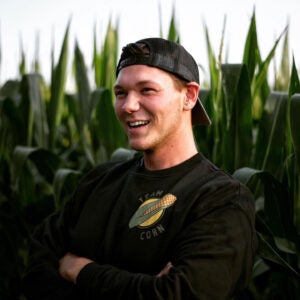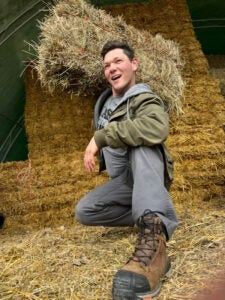Hayden Fox is a multi-generational Canadian farmer who has amassed more than 2 million followers on TikTok — and he is working hard to share his love of agriculture and diversity in our industry with his followers.
At the heart of his outreach is a family-owned farm in Ontario that he works on with his father, Jerry, and uncle, Carl, producing four thousand acres of hay, corn, soybean, and other cash crops.
“Growing up, my family expected me to take over the farm, but I thought that I would never become a farmer, that it just wasn’t for me,” the 25-year-old said.
It wasn’t until Fox finished high school and took a gap year traveling in Europe that he changed his mind. After visiting some farms in Europe, Fox realized just how ubiquitous farming was, and found his curiosity piqued. This prompted him to learn more about agriculture and farming when he returned to Canada and began studying at the University of Guelph.
After taking several classes, Fox was enchanted by the agricultural world and loved that “there’s so much more to farming than sitting in a tractor all day – there’s marketing, there’s accounting, there’s logistics.”
After he earned his degree in food and agricultural business, he decided to return to his family’s operation, named Fox Farm.

Fox said he feels incredibly privileged to work with his family members, who bring decades of expertise to agriculture and actively mentor him and show him their successful on-farm practices. Yet, Fox does acknowledge that there sometimes is generational friction, where the older generation on their farm is wary of newer farming techniques that the younger Fox may be more keen to implement.
For example, Fox Farm used to till everything, but over time, as they saw that no-till was better for soil health, they changed their practices to help create a better environment for their crop. They also introduced bees onto their fields, actively put in efforts to reduce soil erosion, and started planting cover crops.
Fox said he tries to remember that older practices are tried and true, and acknowledges that a balance has to be struck between the two.
“I’m always trying to advance the farm, but never try to take it so quickly such that it loses its tradition or the culture of farming,” he said.

Sustainable production and family harmony are particularly important in a province like Ontario, where urban sprawl is gobbling up farmland at a rapid rate. Because of the nearby cities and competing development, Ontario has lost an average 319 acres of farmland a day.
Fox Farm is only an hour’s drive to Toronto, which has 2.6 million residents and is the nation’s largest city.
“Not only are you competing with farmers, but also developers, who are constantly coming out here, [making it] difficult to keep the land we have,” Fox explained. He noted, too, that the concerns about land access has been a persistent one, going back to his forefathers.
The difference however, is how the land is managed.
“When my grandpa was farming, people would literally come to him and ask if he would farm their land for free,” he said, just to have someone maintain it for them. Nowadays, Fox said that “there’s almost like a bidding war for the land, because there’s so little left of it.”
Such endeavors make farming as a profession significantly more expensive for farmers, narrowing their already thin profit margin.
These are just a fraction of the things Fox addresses across his social media platforms, of which TikTok is the biggest. But in his outreach, Fox adds a comedic twist to help educate others on farming.
His venture into social media all started one day with a client — “I was dropping off straw to her but she kept calling it hay, so I decided to make a funny video about it,” Fox said.
Many of Fox’s videos feature various facets about farming, such as costs of a corn field, how he and his family deal with homophobic clients, or just wholesome dance videos with his father.
@haydenjfox one single bag of corn costs how much?! #farming #corn #plantingseason ♬ original sound – Hayden Fox
Three years later, Fox’s content continues to be educational with a humorous twist, sharing not just agricultural trivia but also personal stories and experiences.
That includes his identity as a queer individual, which he said can be jarring to other farmers, who describe him as “too flamboyant, or fruity” to be a real farmer.
“There’s a stereotype that a gay farmer doesn’t work as hard, or that LGBTQ people might be in the ag sector, but not on the farm itself as a field hand or a tractor driver.”
But Fox definitely breaks that stereotype.
And while it is challenging, he is persistent.
“It’s my livelihood, and I want people to like me for my business and not some other aspect of my identity,” Fox said.
He said he feels that simply by being himself, he is breaking ground on traditional mindsets that have traditionally been unwelcoming. In one example, Fox talked about a neighbor who came over one day and told him not to wear what he was wearing, to be less bubbly, less “like that,” implying that it was not becoming of a farmer.
“I don’t even feel I dress that differently from traditional farmers, but I guess what I was wearing that day struck a nerve,” Fox said.
Two weeks later, when that neighbor’s combine broke down, Fox went to help him and could see his neighbor’s perception of him change before his very eyes.
“People think I’m something, and I blow their mind just being myself,” Fox said.
Fox is carving out a one-of-a-kind role for himself and showing the agricultural sector that diversifying the field doesn’t compromise the integrity of farming.
When asked about the future of farming, Fox imagines that the diversity will only increase — not just in the faces of those on the farm, but in their roles as well.
“Non-traditional people are coming onto farms, like agronomists or chemists, to help farmers run their operations,” he said. “People who never thought they would become farmers will become farmers.”
Liza Thuy Nguyen serves as the 2023 American Farmland Trust Agriculture Communications Intern at AGDAILY, with a focus on helping to amplify diversity and minority voices in agriculture. Liza is originally from Anaheim, California, and attended the University of California, Davis, as a first-generation college student. She received a bachelor’s degree in genetics and genomics and went on to earn a master’s in horticulture from Penn State.




